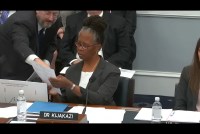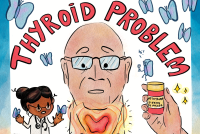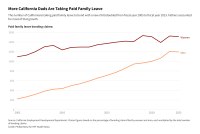Latest KFF Health News Stories
Social Security Clawbacks Hit a Million More People Than Agency Chief Told Congress
More than 2 million people a year have been sent notices that Social Security overpaid them and demanding they repay the money. That’s twice as many as the head of Social Security disclosed at a congressional hearing in October.
Watch: The Long-Term Care Crisis: Why Few Can Afford to Grow Old in America
Long-term care options in the U.S. are costly, complex, and often inadequate. KFF Health News’ Jordan Rau and Reed Abelson of The New York Times host a Zoom panel to explore the challenges of providing — and affording — care.
Watch and Listen: Opioid Settlement Case Triggers Protests Outside the High Court
The Supreme Court heard arguments over whether the Sacklers, the family behind Purdue Pharma — which marketed OxyContin — could claim immunity from future lawsuits without claiming bankruptcy.
‘Forever Chemicals’ Found in Freshwater Fish, Yet Most States Don’t Warn Residents
At least 17 states have issued PFAS-related fish consumption advisories, KFF Health News found. But with no federal guidance, what is considered safe to eat varies significantly among states, most of which provide no regulation.
What the Health? From KFF Health News: Trump Puts Obamacare Repeal Back on Agenda
Although Republicans have never united behind a replacement for the Affordable Care Act, 2024 GOP presidential front-runner Donald Trump said this week he wants to put the issue back on the national agenda. That delights Democrats, who have won at least two elections partly by defending the now-popular health law. Meanwhile, the Texas Supreme Court takes up a case brought by women who say their pregnancy complications further endangered their health due to the vagueness of Texas’ near-total ban on abortions. Joanne Kenen of Johns Hopkins University and Politico Magazine, Sarah Karlin-Smith of the Pink Sheet, and Victoria Knight of Axios News join KFF Health News chief Washington correspondent Julie Rovner to discuss these issues and more. Also this week, Rovner interviews KFF Health News’ Rachana Pradhan, who reported and wrote the latest “Bill of the Month” feature.
An Arm and a Leg: To Get Health Insurance, This Couple Made a Movie
On this episode of “An Arm and a Leg,” hear how a couple wrote and directed a short film, starring one of them — just to maintain health insurance through the actors union.
‘Everybody in This Community Has a Gun’: How Oakland Lost Its Grip on Gun Violence
A few years ago, Oakland won national acclaim for slashing gun-related crimes. Then the covid-19 pandemic tore through poor neighborhoods, and the murder of George Floyd fueled distrust in police. With guns readily available, violent crime has once again skyrocketed, leaving the community struggling to contain it.
How the Thyroid Gland Mystifies Doctors and Patients
This illustrated report has been adapted from a KFF Health News article, “Many Autoimmune Disease Patients Struggle With Diagnosis, Costs, Inattentive Care” by Andy Miller, with artwork by Oona Tempest.
KFF Health News editor-at-large for public health Céline Gounder discusses how families of transgender youth are uprooting their lives due to anti-trans policies and their ripple effects.
Out for Blood? For Routine Lab Work, the Hospital Billed Her $2,400
Convenient as it may be, beware of getting your blood drawn at a hospital. The cost could be much higher than at an independent lab, and your insurance might not cover it all.
What the Health? From KFF Health News: Congress Kicks the (Budget) Can Down the Road. Again.
Congress narrowly avoided a federal government shutdown for the second time in six weeks, as Democrats came to the rescue of divided House Republicans over annual spending bills that were supposed to be finished by Oct. 1. But the brinksmanship is likely to repeat itself early in 2024, when the next temporary spending patches expire. Meanwhile, a pair of investigations unveiled this week demonstrate how difficult it still is for seniors to get needed long-term and rehabilitation care. Alice Miranda Ollstein of Politico, Rachel Cohrs of Stat, and Joanne Kenen of Johns Hopkins University and Politico Magazine join KFF Health News’ Julie Rovner to discuss these issues and more.
What the Health? From KFF Health News: A Very Good Night for Abortion Rights Backers
Abortion rights backers won major victories in at least five states in the 2023 off-year elections Nov. 7, proving the staying power of abortion as a political issue in the wake of the Supreme Court’s 2022 decision overturning Roe v. Wade. Meanwhile, the National Institutes of Health finally has a new director, after Democrats temporarily blocked President Joe Biden’s nominee over a mostly unrelated fight about prescription drug prices. Alice Miranda Ollstein of Politico, Tami Luhby of CNN, and Sandhya Raman of CQ Roll Call join KFF Health News’ Julie Rovner to discuss these issues and more. Also this week, Rovner interviews KFF Health News’ Julie Appleby, who reported and wrote the latest “Bill of the Month” feature.
An Arm and a Leg: ‘Your Money or Your Life’: This Doctor Wrote the Book on Medical Debt
What happens when you can’t afford the health care you need? On this episode of “An Arm and a Leg,” hear from emergency medicine physician and historian Luke Messac about the history of medical debt collection in the United States.
Epidemic: The Scars of Smallpox
The series finale of “Epidemic: Eradicating Smallpox” is a visit to the home of Rahima Banu, the last person with a documented case of naturally occurring variola major smallpox. When the virus was declared eradicated, she became a symbol of one of the greatest victories in global public health. What happened to Rahima Banu afterward?
What the Health? From KFF Health News: For ACA Plans, It’s Time to Shop Around
It’s Obamacare open enrollment season, which means that, for people who rely on these plans for coverage, it’s time to shop around. With enhanced premium subsidies and cost-sharing assistance, consumers may find savings by switching plans. It is especially important for people who lost their coverage because of the Medicaid unwinding to investigate their options. Many qualify for assistance. Meanwhile, the countdown to Election Day is on, and Ohio’s State Issue 1 is grabbing headlines. The closely watched ballot initiative has become a testing ground for abortion-related messaging, which has been rife with misinformation. This week’s panelists are Mary Agnes Carey of KFF Health News, Jessie Hellmann of CQ Roll Call, Joanne Kenen of the Johns Hopkins Bloomberg School of Public Health and Politico, and Rachana Pradhan of KFF Health News.
“Peor de lo que la gente cree”, cambios en Medicaid crean caos en los estados
Tanto beneficiarios como defensores de pacientes dicen que los funcionarios de Medicaid enviaron formularios de renovación obligatoria a direcciones viejas, calcularon mal los niveles de ingresos e hicieron malas traducciones de los documentos.
‘Worse Than People Can Imagine’: Medicaid ‘Unwinding’ Breeds Chaos in States
As Medicaid programs across the nation review enrollees’ status in the wake of the pandemic, patients struggle to navigate the upheaval.
Medical Debt and Nurse Shortages Haunt Winning Halloween Haikus
Entries for our fifth annual Halloween haiku contest left us terrified. Based on a review by our panel of judges, here’s the winner and runners-up — plus the original artwork they inspired.
An Arm and a Leg: John Green vs. Johnson & Johnson (Part 2)
The high price of lifesaving tuberculosis drugs makes them inaccessible to many who need them most. On this episode of “An Arm and a Leg,” hear how a decades-long global fight to reform drug patents is helping to lower the cost.
Dads Drive Growth in California’s Paid Family Leave Program
The number of men in the state taking paid family leave to bond with a new child has risen nearly 20% since the start of the pandemic.




















